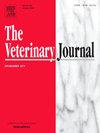诱导和测量家养马的积极情感状态:德尔菲咨询
IF 3.1
2区 农林科学
Q1 VETERINARY SCIENCES
引用次数: 0
摘要
在过去的二十年里,良好动物福利的定义已经从“没有负面福利国家”发展到确定积极福利国家的存在;然而,积极动物福利的研究是相对较新的。因此,通过专家咨询,本研究旨在综合有关驯养马情绪状态的知识,特别是诱导和测量积极情绪状态的方法,这可能对跨部门的马福利有重大好处。对马的行为、福利和情感状态领域的专家进行了德尔菲咨询,以得出在考虑马的积极情感状态时所使用的定义的共识,以及在实验调查中诱导和测量这些状态的合适方法。九十三名国际专家参与了强有力的三轮德尔菲咨询,收集的数据进行了定性分析(专题分析)和定量分析(排名数据、共识基准和内容效度指数(CVI) /内容效度比(CVR)分析)。保留率很高(78 %),并且在第三轮咨询中达成共识(至少70 %同意)。19种诱导积极影响的方法达成了共识(提供高价值的食物,一个亲密的伴侣和一个底物在排名最高的地方滚),12种行为(评估肢体语言,面部动作和马-马互动排名最高)和3种测量积极影响的生理变量(评估心率,心率变异性和呼吸频率)也达成了共识。这个咨询强调了几个重要的考虑因素,围绕着马的积极情感状态的诱导和测量,包括考虑个人的个性和个人偏好在任何情感状态的测量。因此,我们建议建立个人偏好应该是研究积极情感状态的先决条件。期望本研究的结果可以为积极情感状态的研究提供新的方向,为政策和实践提供专家认同的方法和措施,通过专家认同的途径诱导马的积极情感。本文章由计算机程序翻译,如有差异,请以英文原文为准。
Inducing and measuring positive affective state in domesticated equines: A Delphi consultation
Over the last twenty years the definition of good animal welfare has advanced from the ‘absence of negative welfare states’ to the aim of identifying the presence of positive welfare states; however, research on positive animal welfare is relatively new. Consequently, through expert consultation, this study aimed to synthesise knowledge regarding domesticated equine emotional state, specifically methods to induce and measure positive affective states, which could be of significant benefit to equine welfare across sectors. A Delphi consultation of experts in the field of equine behaviour, welfare and affective state was undertaken to derive consensus agreement on definitions used when considering positive affective state in equines and methods suitable for inducing and measuring these states within experimental investigations. Ninety-three international experts participated in a robust three-round Delphi consultation with data gathered analysed qualitatively (thematic analysis) and quantitatively (ranking data, consensus benchmarks and Content Validity Index (CVI) / Content Validity Ratio (CVR) analyses). Retention rates were high (78 %), and consensus (minimum 70 % agreement) was reached within Round three of the consultation. Nineteen methods for inducing positive affect reached consensus (provision of high value food, an affiliative companion and a substrate to roll in where the highest ranked), and twelve behavioural (assessment of body language, facial actions and horse-horse interactions were ranked highest) and three physiological (evaluation of heart rate, heart rate variability and respiratory rate) variables for measuring positive affect also reached consensus. This consultation highlights several important considerations surrounding the induction and measurement of positive affective state in equines, including consideration of the individual’s personality and individual preference within any measures of affective state. We therefore recommend that establishing individual preference should be a prerequisite of research into positive affective states. It is anticipated that the results of this study can be used to provide new direction for research on positive affective states by providing expert agreed methods and measures for policy and practice through expert agreed approaches to induce positive affect in horses.
求助全文
通过发布文献求助,成功后即可免费获取论文全文。
去求助
来源期刊

Veterinary journal
农林科学-兽医学
CiteScore
4.10
自引率
4.50%
发文量
79
审稿时长
40 days
期刊介绍:
The Veterinary Journal (established 1875) publishes worldwide contributions on all aspects of veterinary science and its related subjects. It provides regular book reviews and a short communications section. The journal regularly commissions topical reviews and commentaries on features of major importance. Research areas include infectious diseases, applied biochemistry, parasitology, endocrinology, microbiology, immunology, pathology, pharmacology, physiology, molecular biology, immunogenetics, surgery, ophthalmology, dermatology and oncology.
 求助内容:
求助内容: 应助结果提醒方式:
应助结果提醒方式:


